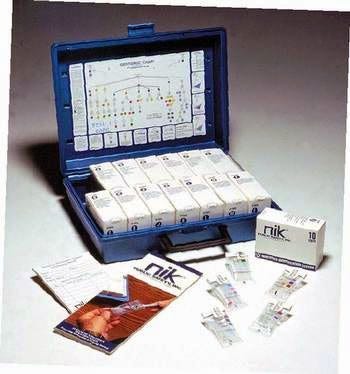Inaccurate police drug testing kits are a 'secret'

The following excerpts are taken from the NHTSA report "Field Test of On-Site Drug Detection Devices".
"We will be evaluating the accuracy of the devices against the most accurate laboratory standard available - GC/MS testing. However, perhaps the key distinguishing feature of this project is that it is a field test. NHTSA and the Center for Human Toxicology have already conducted a thorough laboratory test of the leading on-site drug screening devices. The goal of this project is to assess how well these devices perform when placed in the hands of trained law enforcement personnel as they conduct their routine duties. Techniques that perform well in the laboratory may falter when brought into the "real world" of law enforcement. The research will evaluate how law enforcement officers can use these screening devices as supporting evidence in the detection of drugs in the driving population."
Did you catch that? The NHTSA claims its a 'field test' so it's not really accurate and police officer 'techniques' may falter. What they're really saying is they aren't reliable!
There is not a single reputable laboratory or governmental agency which has been able to establish what the critical level of THC is that constitutes impairment.
The Southwestern School of Law say's they shouldn't even be allowed in our courts.
Below is an excerpt from the study:
"A preliminary test is not equivalent to an actual positive identification, and this important difference will be discussed in more detail later. In short, a preliminary test only actually tests for “possible presence or absence of a particular molecular grouping.” Thus, the tests are useful to determine if a substance is not present or if further identification tests are warranted."
The NHTSA goes on to claim:
"The field test will also allow us to assess how the on-site screening devices can provide additional information for the Drug Evaluation and Classification (DEC) program. DEC officers in the participating sites will assist the project staff in the evaluation of the on-site devices. However, this project will not evaluate the performance of the DEC officers. At the sites, trained Drug Recognition Experts will conduct DEC assessments on DUI and DUID suspects and will also conduct some of the on-site drug testing devices."
Police officers who suspect, but may not be able to prove with certainty, a driver is under the influence of something other than alcohol have the option of calling a DRE. The evaluation process has similarities to a drunken driving test, but it “takes it a little further” according to Sgt. Mark Bliss of the Scotts Bluff County Sheriff’s Department.
“There are not enough DREs. We could always use more,” said Becky Stinson, the coordinator of the DRE program for the Office of Highway Safety.
Police are not 'Drug Recognition Experts' it's a lie and it got its start by police officers from Calif. inventing ways to make more money by using unscientific methods to detect what drug a person is on by observing a person's pupil dilations. Click here, here, & here to read more.
"Two LAPD sergeants collaborated with various medical doctors, research psychologists, and other medical professionals to develop a simple, standardized procedure for recognizing drug influence and impairment. Their efforts culminated in the development of a multi-step protocol and the first DRE program."
There are currently more than 6,300 active DREs in the United States. There are also more than 500 in Canada. Other countries are also starting to train DREs, including China, Australia, Germany and the Virgin Islands.
If you guessed Homeland Security is behind DRE's give yourself a gold star. The International Association of Chiefs of Police (IACP) is the regulating and certifying organization for the DRE program. The IACP works hand-in-hand with DHS.
Click here, here and here to read more.
NHTSA tells police to keep the results of the 'field test' a secret
"The Research Analyst will have confidential information about the participant to which they would not normally have access. Your protection of all information about participants gained during the conduct of research is, therefore, essential. We have promised participants that we will not reveal the results of their tests (unless they provide their consent). Participants' data will be combined with those of others in the data collection and the results will be reported as group percentages and totals in such a way that no participants name could be associated with any results."
"IT IS YOUR DUTY TO KEEP THE PROMISE OF CONFIDENTIALITY. NEVER TELL FACTS ABOUT, OR REVEAL INFORMATION ABOUT ANY PARTICIPANT. Information or results collected during the study can be shared only with the research team, whose members are under the same ethical and moral duty to the people interviewed as you are."
Marijuana breathalyzers & drug testing field kits lead to many false positives. Click here, here & here to read more.
There is no marijuana breathalyzer, so how can police tell if a driver is high?
Inaccurate police field tests put two people in jail for a month.
In Minnesota a man spent months in jail on drug possession charges after police mistook a half-ounce bag of vitamin powder for drugs.
A search of his car turned up a small bag of powder that police believed were illegal drugs. They conducted a field test, which came back positive for amphetamine and Burrell was charged with two felony counts of drug possession.
“I told the judge I couldn’t plead guilty to something I knew wasn’t a drug,” Burrell said, according to the Mankato Free Press. The judge set his bail at $250,000.
The Washington Post posted a partial list of false positives that drug testing kits have claimed to be drugs:


